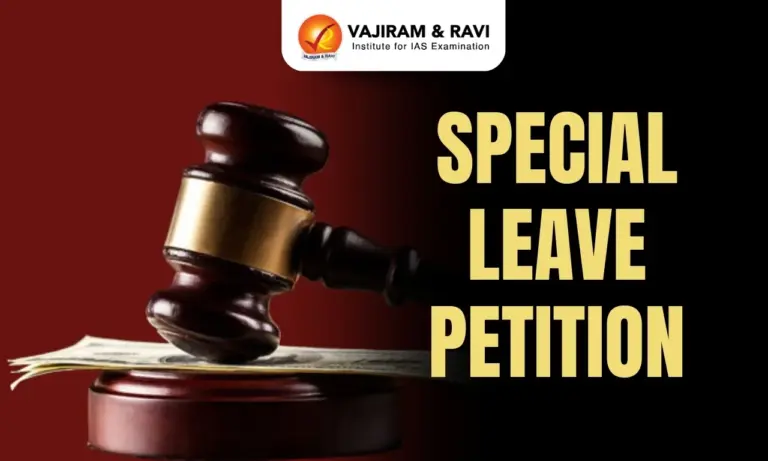Special Leave Petition Latest News
The Jammu & Kashmir and Ladakh High Court recently observed that dismissal of a Special Leave Petition (SLP), whether by a speaking or non-speaking order, does not lead to merger of the impugned order with the Supreme Court’s order.
About Special Leave Petition
- A SLP is a request made to the Supreme Court of India seeking special permission to appeal against any judgment, order, or decree from any court or tribunal (except military tribunals), even when the law does not provide a statutory right of appeal.
- In other words, SLP is not a right—it’s a privilege granted by the Supreme Court at its discretion.
- Article 136 states that the Supreme Court may, in its discretion, grant special leave to appeal from any judgment, decree, determination, or order from any court or tribunal in India.
- It can only be exercised when a substantial question of law or gross injustice has been committed.
- A judgement, decree, or order need not be final for an SLP. An interim or interlocutory order, decree, or judgement can also be challenged.
- It is a discretionary/optional power of the SC, and the court can refuse to grant the appeal at its discretion.
- The aggrieved party can’t affirm a special leave to offer under Article 136 as a right.
- SLP can be filed by:
- Any aggrieved party (individual or business)
- Government bodies
- Public sector undertakings
- NGOs or associations (in relevant cases)
- The key requirement is that the party must be aggrieved by the impugned judgment or order.
- An SLP can be filed for any civil or criminal matter, etc.
- SLP can be filed against judgments from:
- High Courts
- Tribunals (except those under armed forces)
- Quasi-judicial bodies
- Time limit to file SLP:
- It can be filed against any judgment of the High Court within 90 days from the date of judgment or
- It can be filed within 60 days against the order of the High Court refusing to grant the certificate of fitness for appeal to SC.
- Procedure for a SLP:
- A SLP must contain all the facts upon which the SC is to decide, which revolve around the grounds on which an SLP can be filed.
- The said petition needs to be duly signed by an Advocate-on-Record.
- The petitioner must include a statement within the SLP stating that no other petition has been filed in a High Court.
- Once the petition is filed, the SC will hear the aggrieved party and depending upon the merits of the case, will allow the opposite party to state their part in a counter affidavit.
- After the hearing, if the court deems the case fit for further hearing, it will allow the same; otherwise it will reject the appeal.
Source: LL
Last updated on February, 2026
→ UPSC Notification 2026 is now out on the official website at upsconline.nic.in.
→ UPSC IFoS Notification 2026 is now out on the official website at upsconline.nic.in.
→ UPSC Calendar 2026 has been released.
→ UPSC Final Result 2025 is expected to be released in the first week of March 2026.
→ Check out the latest UPSC Syllabus 2026 here.
→ Join Vajiram & Ravi’s Interview Guidance Programme for expert help to crack your final UPSC stage.
→ UPSC Mains Result 2025 is now out.
→ UPSC Prelims 2026 will be conducted on 24th May, 2026 & UPSC Mains 2026 will be conducted on 21st August 2026.
→ The UPSC Selection Process is of 3 stages-Prelims, Mains and Interview.
→ Prepare effectively with Vajiram & Ravi’s UPSC Prelims Test Series 2026 featuring full-length mock tests, detailed solutions, and performance analysis.
→ Enroll in Vajiram & Ravi’s UPSC Mains Test Series 2026 for structured answer writing practice, expert evaluation, and exam-oriented feedback.
→ Join Vajiram & Ravi’s Best UPSC Mentorship Program for personalized guidance, strategy planning, and one-to-one support from experienced mentors.
→ Check UPSC Marksheet 2024 Here.
→ UPSC Toppers List 2024 is released now. Shakti Dubey is UPSC AIR 1 2024 Topper.
→ Also check Best UPSC Coaching in India
Special Leave Petition FAQs
Q1. Special Leave Petition is governed under which Article of the Indian Constitution?+
Q2. Within how many days can an Special Leave Petition be filed against a High Court judgment?+
Q3. Can Special Leave Petition be filed in both civil and criminal matters?+
Tags: prelims pointers special leave petition upsc current affairs upsc prelims current affairs


















